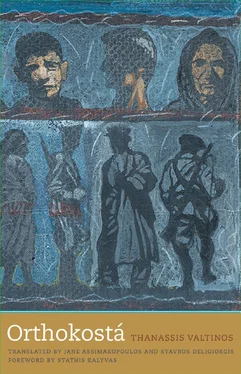Does its unrelenting focus on this complex reality make Orthokostá an amoral account? Quite the opposite. I would argue instead that it is deeply moral. Although no attempt is made to apportion responsibility for the atrocities, several stories contain elements of a “moral economy” shared by most narrators, one that privileges an understanding of individual responsibility embedded in its context, as opposed to a general and abstract judgment. In this view, most people are seen as subject to their own passions and the prevailing social norms, victims of the terrible situation in which they found themselves. It is often hard to blame them, for they are hardly masters of their own volition. Nor, obviously, can they be praised. Yet at the same time certain actions are singled out, either positively or negatively: positively, when people transcend their limitations to perform unexpected good deeds (“He wasn’t a die-hard Communist. He would cover for our fellow villagers.”); negatively, when individuals transcend them in the opposite direction to commit random or excess violence, as do militiamen such as the Galaxýdis brothers and Kóstas Kotrótsos, who were trigger-happy, looters, “unprincipled drifter[s],” or simply “animal[s],” or the old man who helped the militiamen set a house on fire:
And on their way up to the square old Yiánnis Prásinos says, Haven’t you set it ablaze yet? And he took out his flint lighter. They were going to burn it down one way or another. But old Yiánnis, he gave them his lighter. He tossed it to them from his bench. May God forgive him.
Orthokostá may be read as an account of the Greek Civil War as it was experienced in the villages of Kynouria: it is a fascinating and enlightening one. But it may also be read much more broadly, as an account of the human experience in the midst of extraordinarily harsh circumstances. This latter reading resonates powerfully with journalistic reports from contemporary civil wars and also with Thucydides’ description of civil strife in the earlier Peloponnesian War: “Human nature, always ready to offend even where laws exist, showed itself proudly in its true colours, as something incapable of controlling passion, insubordinate to the idea of justice, the enemy to anything superior to itself.”
Orthokostá’ s narrators reassert, via Valtinos, Thucydides’ perspective when they offer observations and reflections that encapsulate everlasting, almost biblical, truths:
It was God’s wrath, all that, there’s nothing else you can say.
And may all that never happen again.
INTRODUCTION by Stavros Deligiorgis
Notre histoire est noble et tragique
Comme le masque d’un tyran.
— Guillaume Apollinaire, “Cors de chasse,” Alcools (1913)
When Thanassis Valtinos first began writing, the literary climate in Greece was not particularly auspicious for fiction. Poetry was the dominant medium of expression, and formidable writers like George Seferis, Odysseas Elytis, Andreas Embirikos, and Yannis Ritsos were in the forefront, giving Greek poetry both national and international acclaim. The appearance in 1963 of Valtinos’s novel Η κάθοδος των εννιά (The Descent of the Nine), however, set the pace for new forms of expression in prose fiction that had no precedent in terms of immediacy, terseness, and use of controversial subject matter — with the possible exception of the memoirs of the nineteenth-century general Ioannis Makrygiannis (published in 1907). Among Valtinos’s contemporaries few had ventured to broach the occulted subject of the 1947–49 Greek Civil War in all its problematical dimensions. And while it was obvious to everybody that Valtinos’s first novel dignified the sacrifices made in a lost ideological cause, it was also impossible for anyone to miss the harsh reality imposed by his telegraphic medium: the actual voices of the nine antigovernment rebels who perished through a variety of mishaps in an inhospitable landscape that forever withheld the redemption of the sea.
Valtinos’s daring new voice in The Descent of the Nine had been preceded by only one Civil War novel worthy of a subject of such political complexity and demanding such self-examination — Stratis Tsirkas’s Ακυβέρνητες πολιτείες (Drifting Cities, 1961–65) — and followed by a mere handful of comparable attempts, such as Yannis Beratis’s Το Πλατύ ποτάμι (The Wide River, 1946–65), and Aris Alexandrou’s Το Κιβώτιο (The Box, 1974). But these were solitary works; Valtinos has been revisiting the Civil War tragedy in cycles over the years, with narratives both long and short, most powerfully Orthokostá (1994). Taken together with Valtinos’s other major works, Orthokostá holds pride of place as the most successful testing of the range fiction writing can achieve when plumbing the spaces between language and memory and the shading of the inhuman into the humane. History in the making seems to be the chief end of the present novel, even as its numerous asides imply the impossibility of viewing history divorced from the light of art and thought.

Valtinos has sandwiched his narrative between two texts, one ascribed to an eighteenth-century cleric named Isaakios, perhaps the last humanist to project the virtues of ancient Arcadia onto the landscape of the southeastern Peloponnese, the Christian monastery in its middle notwithstanding; and the other an epilogue that debunks the good cleric’s utopian opener. Between the extreme sublimation at the outset and the grim realities that have intervened by the end, the novel similarly appears to have two hearts: one beating to the drum taps of the ancient epics, the other to the transport of lyricists like Tyrtaeus, Callinus, and George Seferis.
It would be natural for an explorer of literary texts to want to prospect, upon first leafing through this book, for the presence of any sign promising the joyful experience of poetry — the aspect of any artifact, in other words, that would determine the quality of the time invested in the reading. If the precritical indicators could serve as guides and Orthokostá proved indeed to be the kind of “news that STAYS news,” in Ezra Pound’s definition, they certainly informed the impact that the book made when it was launched in 1994. A first rather short, page-long chapter, a much longer second, and then a surprising, barely twenty lines long, third must surely have raised intriguing questions regarding the conventions Orthokostá embodied. These rough, apperceptive data are the novel’s invitational markers — one thinks of the four initial notes of Beethoven’s Fifth — and a persistent reminder that the general thrust of the narrative and the relationship of its parts to the whole would need to be viewed on an equal footing with its other, more discursive materials.
Keeping both the content and its organization constantly before the mind’s eye is a balancing act few readers of the prose classics, be they by Montaigne or Tolstoy, manage to maintain. Orthokostá’ s irresistible human representations, its numerous dramatis personae coming slowly and rather mysteriously into focus, have tended to attract more vocal and more articulate responses than the book’s structure and its semi-transparent message. The terror that spread throughout the Greek countryside during the fratricidal period, roughly between 1943 and 1946, the appalling suffering it caused, as well as the survivors’ stories, would be hard to ignore. The book, however, communicates not long after its curtain raisers that it is as much about the many tortured tales men and women tell as it is about the drama of the disembodied voice-over experiences in its interviews and its surprising shorter but cryptic interjections. The latter, refrain-like sections — without which the book would hardly make sense — serve to reorient the reader away, momentarily, from the chronicles of the direct rightist or leftist depositions and toward a more meditative mode, in effect, toward the enigma of the aesthetic composition of the book as a whole. Shifting between elegy and anecdote, exorcism and self-exculpatory soliloquy, tableau and interview, novella and epiphany, Orthokostá exhibits virtuoso syncopation on the one hand and the infinite drama of the themes of the classical canon on the other.
Читать дальше



